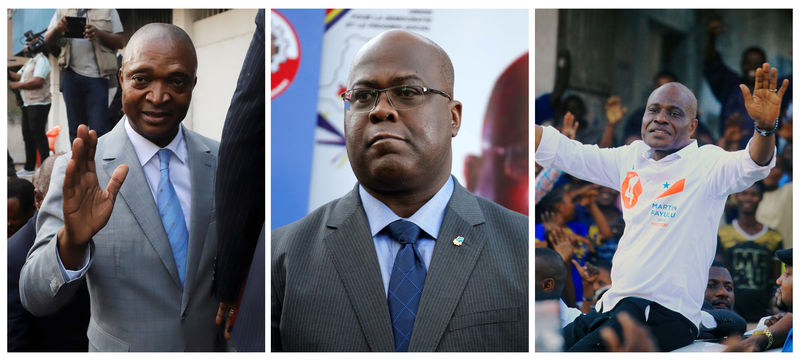By Juliette Jabkhiro
DAKAR (Reuters) - Democratic Republic of Congo will vote on Dec. 23 in a long-delayed election that could enable the vast Central African country's first democratic transfer of power since independence from Belgium in 1960.
President Joseph Kabila is due to step down after 18 years in the office he inherited from his assassinated father, and two years after his constitutional mandate officially expired.
Here's what is at stake:
WHY DOES IT MATTER?
Congolese hope the election can help turn the page on a violent history - or at least head off an even darker turn.
Starting with the Belgian- and American-backed overthrow of independence leader Patrice Lumumba in 1960, every transfer of power has come at the barrel of a gun. That included autocrat Mobutu Sese Seko's overthrow in 1997 after 32 years in power and his successor Laurent-Desire Kabila's assassination in 2001.
Two regional wars between 1996 and 2003, triggered in part by the 1994 genocide in neighboring Rwanda, sucked in a half-dozen regional armies and resulted in millions of deaths.
Since then, Congo has remained a violent place and fighting between the government and rebel militia has sent hundreds of thousands of refugees fleeing across its borders.
Regional powers such as Angola and Rwanda pushed for Kabila to step down after his refusal to do so when his mandate expired in 2016 caused violent protests and worsened militia violence.
WHAT ABOUT FOR INVESTORS?
Congo is the world's biggest producer of cobalt, a key component in batteries for electric cars and mobile phones. It is also Africa's top copper miner and a significant producer of gold.
That makes the election of keen interest to mining companies such as Glencore (LON:GLEN), Randgold (LON:RRS) and China Molybdenum, which are in dispute with the government over a new mining code passed this year that hikes taxes and royalties.
Kabila's preferred candidate, Emmanuel Ramazani Shadary, would be likely to continue the recent hard line with foreign investors. His main challengers have said little on the subject.
WHO'S GOING TO WIN?
Twenty-one candidates will appear on the presidential ballot, but only three are considered serious contenders.
Shadary, a former interior minister, was little known before Kabila named him in August to run. But he has strong support from government institutions and a sizeable campaign war chest.
He faces a divided opposition, which agreed last month to back former ExxonMobil (NYSE:XOM) manager Martin Fayulu as its candidate, only for Felix Tshisekedi, the president of Congo's largest opposition party, to back out of the deal.
A rare national opinion poll in October showed Tshisekedi on 36 percent, with 16 percent for Shadary and 8 percent for Fayulu.
Besides the presidential race, voters will also elect representatives for provincial and national assemblies.
WHAT COULD GO WRONG?
A lot.
Violence last week in which security forces killed at least seven opposition supporters and a fire that destroyed thousands of voting machines were timely reminders of how quickly things can turn sour.
The disputed results of prior elections in 2006 and 2011 sparked violent protests, and there is every indication that losing candidates will again cry foul.
Congo is sub-Saharan Africa's largest country and has a population somewhere around 80 million (the last official census was in 1984). The lack of roads across vast expanses of its forested interior, attacks by dozens of eastern militia groups and a worsening Ebola outbreak there mean the underfunded electoral commission (CENI) faces a Herculean task.
The government's decision to turn down international help, saying it would undermine national sovereignty, has not helped.
CENI is rolling out tablet-like voting machines for the first time and they could be a source of controversy. Opposition candidates say they are vulnerable to rigging and could be compromised by unreliable power supplies.
WHAT CHALLENGES WILL THE NEW PRESIDENT FACE?
The new president will have his hands full. Nearly 13 million Congolese don't have enough to eat, militia continue to massacre civilians in the east, and the Ebola outbreak, already the second deadliest in history, isn't expected to be brought under control until at least mid-2019.

There is also the question of what Kabila will do after leaving the presidency. If Shadary wins, analysts say Kabila could try to pull the strings from behind the scenes. If an opposition candidate wins, he will have to contend with institutions stacked with Kabila loyalists.